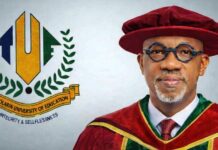Gunmen suspected to be herdsmen have killed at least 10 people in two communities in Benue state.
The communities are Gbeji in Ukum local government area and Tswarev district of Logo local government.
Fatai Owoseni, commissioner of police in the state, confirmed the attacks, saying they happened on Tuesday night.
Disclosing that some corpses had been recovered, he said security personnel had been deployed to restore peace.
“There was an incident in Gbeji and we are investigating. There was said to be an attack by suspected herdsmen in the area but we can confirm that as at this morning (Wednesday), four dead bodies were recovered there. We have stepped up security in the area and we are investigating,” he said.
Witnesses said the attackers destroyed houses and injured many people in the operation that lasted for hours.
Richard Nyajo, chairman of Logo LGA, appealed to security agencies to do more in safeguarding lives and property.
Bogal Àbuul, principal secretary-general of the National Union of Road Transport Workers (NURTW) in the state, who is from Ukum, said the suspected herdsmen invaded the town with sophisticated weapons.
Àbuul said despite the presence of security personnel, the attackers operated unchallenged.
Samuel Ortom, governor of Benue, had asked the people to defend themselves with stones.
On Wednesday, President Muhammadu Buhari said his government is working on solutions to the crisis between herdsmen and farmers.
He said the problem worsened as a result of the influx of Pro-Gaddafi fighters from the Sahel region.
He said solutions were being sought for the herdsmen, farmers clashes.
“The problem is even older than us. It has always been there, but now made worse by the influx of armed gunmen from the Sahel region into different parts of the West African sub-region,” the president had said.
“These gunmen were trained and armed by Muammar Gadaffi of Libya. When he was killed, the gunmen escaped with their arms. We encountered some of them fighting with Boko Haram.
“Herdsmen that we used to know carried only sticks and maybe a cutlass to clear the way, but these ones now carry sophisticated weapons. The problem is not religious, but sociological and economic. But we are working on solutions.”















